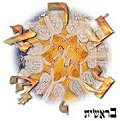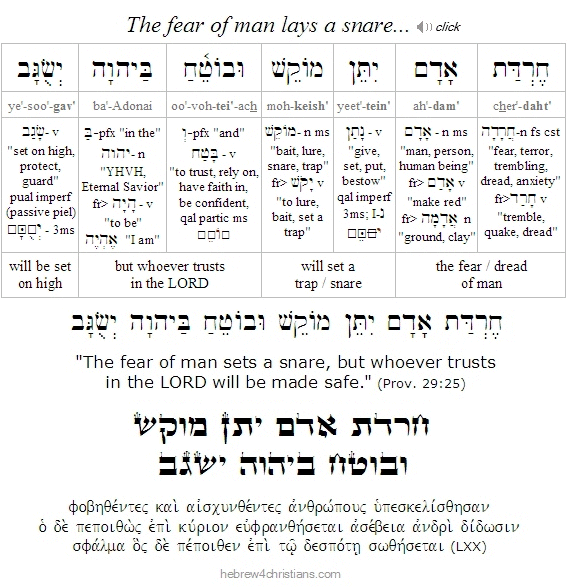|
For reasons not explicitly explained in Scripture, God chose to begin creating the world in apparent chaos: תֹהוּ וָבֹהוּ וְחֹשֶׁךְ עַל־פְּנֵי תְהוֹם / tohu va'vohu ve'choshekh al-penei te'hohm: "formlessness and emptiness and darkness was upon the face of the deep" (Gen. 1:2). The Torah commentator Rashi here notes that the word tohu (תֹהוּ) signifies amazement, for a person would be utterly astonished were he present at that moment, whereas the word bohu (בֹּהוּ) signifies the inconceivable void surrounding the face of the watery depths. But note that the Spirit of God (רוּחַ אֱלֹהִים) was hovering over the depths: "The throne of Divine Glory was standing in space, hovering over the face of the waters by the breath of the mouth the Holy One, blessed be He, and by His command, even as a dove hovers over its nest" (Rashi). From such mystery and darkness God speaks and calls forth divine light, the first of all God's creations evoked by the Word of God (דְּבַר אֱלֹהִים). "And God said: יְהִי אוֹר וַיְהִי־אוֹר - yehi ohr, vayhi-ohr -"Let there be light, and there was light" (Gen. 1:3). God's handiwork in creation, then, first involved demonstrating His creation and mastery of the primordial and elemental forces: earth, water, wind, and light.
One thing we note from these dramatic opening words of Torah is that God our blessed Creator (הַיוֹצֵר הַמְּבוֹרַךְ שֶׁלָנוּ), speaks from the midst of inscrutable winds (סְעָרָה, "tempest"), demonstrating that He is the Sovereign over the seemingly chaotic world (Job 40:6, John 3:8). "Greek-minded" theology is often more comfortable with the idea of "Apollo" (the pagan ideal of harmony and order) than the apparently obscure and inexplicable ways of the LORD God of Israel. The rational mind wants some sort of "systematic theology" so that God may be explained in an orderly and logical way. The idea of mystery and equivocal language is considered problematic. There is danger here that we forget that God is called Esh Okhlah (אֵשׁ אכְלָה), a "consuming Fire" (Deut. 4:24, Heb. 12:29). His thoughts are not our thoughts, neither are His ways our ways (Isa. 55:8-9). As the prophet Isaiah also said: "I form light and create darkness (יוֹצֵר אוֹר וּבוֹרֵא חֹשֶׁךְ), I make peace and create woe (עֹשֶׂה שָׁלוֹם וּבוֹרֵא רָע); I the LORD do all these things (אֲנִי יְהוָה עֹשֶׂה כָל־אֵלֶּה)" (Isa. 45:7).
We live in fearful times, chaverim. People are afraid of losing their money, their health, their freedom, and so on. But we must be careful here. The fear of "losing control" can move us to anger, yet the sages liken anger to idolatry since it denies the providence of God in our lives (i.e., hashgacha partit: השגחה פרטית). Anger over the apparent chaos of life implies that we don't really believe (or accept) that God is in control -- that He is speaking "from the midst of the whirlwind" -- and therefore we feel aggrieved and even embittered by what might happen to us. We must look to God as the Master of the storms of life and draw closer to Him in trust. The Scriptures affirm that for those who love God "all things work together for good" -- even if the present hour seems incomprehensible and even dangerous (Rom. 8:28-39).
Yeshua warned us not to live in fear of man, but rather to live in awe of God (Matt. 10:28). The worst that man can do is "kill the body" but he has no real power over the soul... Tribulation - the "squeezing of grapes" - is part of the life of faith, but we are invited to come "boldly" before the Throne of Grace (παρρησίας τῷ θρόνῳ τῆς χάριτος) to find help for our lives (Heb. 4:16). Note that the word translated "boldly" in this verse (παρρησίας) means that we can speak freely to God from the center of the chaos of our own hearts -- without fear or shame. We don't need to conceal ourselves from the Divine Light, since this is the very Light that overmasters the "tohu va'vohu" chaos of creation! Those who accept that God is in complete control of their lives are set free from the terrible burdens of fear and outrage. Abiding in ahavah shlemah (אַהֲבָה שְׁלֵמָה, God's "perfect love") means that you can let go.
May God help us all remember: חֶרְדַּת אָדָם יִתֵּן מוֹקֵשׁ וּבוֹטֵחַ בַּיהוה יְשֻׂגָּב / "The fear of man lays a snare, but whoever trusts in the LORD will be made safe" (Prov. 29:25). Note that this "fear of man" is not just the fear of external dangers but more deeply is the fear we embrace within our hearts - our own insecurity that undermines our faith.... May the LORD help us abide in His perfect love, free from the ravages of fear, anger, and anxiety. Amen.
Hebrew Lesson:
Proverbs 29:25 Hebrew Lesson (click):
|



